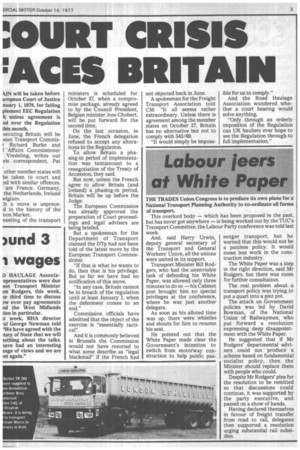:OURT CRISIS 'ACES BRITAIN
Page 5

If you've noticed an error in this article please click here to report it so we can fix it.
MN will be taken before uropean Court of Justice nuary 1, 1978, for failing plement EEC Regulation 9, unless agreement is ed over the Regulation this month.
,secuting Britain will be )ean Transport Commisr Richard Burke and 1 Affairs Commissioner Vredeling, writes our els correspondent, Pat other member states will be taken to court and ,ed with similar offences.
are France, Germany, the Netherlands, Ireland a move is unpreced in the history of the non Market.
fleeting of the transport
)und 3
ui wages D HAULAGE Associavpresentatives were due ieet Transport Minister un Rodgers, this week, le third time to discuss DW over pay agreements nd the West Midlands ion in particular.
;t week, RHA director -al George Newman told 'We have agreed with the tary of State that we will bathing about the talks. lave had an interesting Inge of views and we are ?et again." ministers is scheduled for October 27, when a compromise package, already agreed to by the Council President, Belgian minister Joss Chobert, will be put forward for the second time.
On the last occasion, in June, the French delegation refused to accept any alterations to the Regulation.
To allow Britain a phasing-in period of implementation was tantamount to a renegotiation of the Treaty of Accession, they said.
But now, unless the French agree to allow Britain (and Ireland) a phasing-in period, Britain will be up before the Judge.
The European Commission has already approved the preparation of Court proceedings and legal advisers are being briefed.
But a spokesman for the Department of Transport claimed the DTp had not been told of the latest move by the European Transport Commissioner.
"If that is what he wants to do, then that is his privilege. But so far we have had no notification of this move.
"In any case, Britain cannot be in breach of the regulation until at least January 1, when the deferment comes to an end."
Commission officials have admitted that the object of the exercise is "essentially tactical".
And it is commonly believed in Brussels the Commission would not have resorted to what some describe as "legal blackmail" if the French had not objected back in June.
A spokesman for the Freight Transport Association told CM: "It all seems rather extraordinary. Unless there is agreement among the member states on October 27, Britain has no alternative but not to comply with 543/69.
"It would simply be imposs And, said Harry Urwin, deputy general secretary of the Transport and General Workers' Union, all the unions were united in its support.
Transport Minister Bill Rodgers, who had the unenviable task of defending his White Paper, was allowed only three minutes to do so — his Cabinet post brought him no special privileges at the conference, where he was just another delegate.
As soon as his alloted time was up, there were whistles and shouts for him to resume his seat.
He pointed out that the White Paper made clear the Government's intention to switch from motorway construction to help public pas ible for us to comply."
And the Road Haulage Association wondered whether a court hearing would solve anything.
"Only through an orderly imposition of the Regulation can UK hauliers ever hope to see the Regulation through to full implementation."
senger transport, but he warned that this would not be a painless policy. It would mean less work in the construction industry.
The White Paper was a step in the right direction, said Mr Rodgers, but there was room for further consultation.
The real problem about a transport policy was trying to put a quart into a pint pot.
The attack on Government policies was led by David Bowman, of the National Union of Railwaymen, who put forward a resolution expressing deep disappointment with the White Paper.
He suggested that if Mr Rodgers' departmental advisers could not produce a scheme based on fundamental socialist policy, then the Minister should replace them with people who could.
Despite Mr Rodgers' plea for the resolution to be remitted so that discussions could continue, it was supported by the party executive, and passed on a show of hands.
Having declared themselves in favour of freight transfer from road to rail, delegates then supported a resolution urging substantial rail subsidies.












































































































































































